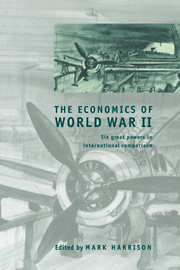Book contents
- Frontmatter
- Contents
- List of figures
- List of tables
- List of contributors
- Preface
- List of abbreviations
- 1 The economics of World War II: an overview
- 2 The United Kingdom: ‘Victory at all costs’
- 3 The United States: from ploughshares to swords
- 4 Germany: guns, butter, and economic miracles
- 5 Italy: how to lose the war and win the peace
- 6 Japan: guns before rice
- 7 The Soviet Union: the defeated victor
- Index
7 - The Soviet Union: the defeated victor
Published online by Cambridge University Press: 12 September 2009
- Frontmatter
- Contents
- List of figures
- List of tables
- List of contributors
- Preface
- List of abbreviations
- 1 The economics of World War II: an overview
- 2 The United Kingdom: ‘Victory at all costs’
- 3 The United States: from ploughshares to swords
- 4 Germany: guns, butter, and economic miracles
- 5 Italy: how to lose the war and win the peace
- 6 Japan: guns before rice
- 7 The Soviet Union: the defeated victor
- Index
Summary
Introduction
The Soviet experience of World War II has too often been seen as beyond comparison. Official Soviet historiography tended to present the war on the eastern front as incomparably tragic and heroic, and as the only struggle which really counted. In the west, selective memory dwelt mainly on the war in western Europe and the Pacific, and sometimes neglected the eastern front altogether. The opportunity to address the Soviet experience from a truly comparative viewpoint is therefore welcome.
Another comparison which the scholar may follow profitably is with the Russian experience in World War I. Mobilization to meet the German threat in 1914 and to fight the first campaigns quickly exhausted the Russian armies and military industries. Imperial Russia was able to remain at war after the first winter only because of Allied aid and because Germany, tied down by trench warfare in the west, was unable to launch a serious attack in the east. Despite this limitation, the German pressure eventually brought Russia to the point of economic and social disintegration and political collapse.
In this chapter I ask why the outcome of World War II was so different for Russia's successor state, the USSR, how the resources were mobilized for the Soviet war effort, what price was paid for victory at the time, and what the long-term consequences of this victory may have been.
- Type
- Chapter
- Information
- The Economics of World War IISix Great Powers in International Comparison, pp. 268 - 301Publisher: Cambridge University PressPrint publication year: 1998
- 6
- Cited by



